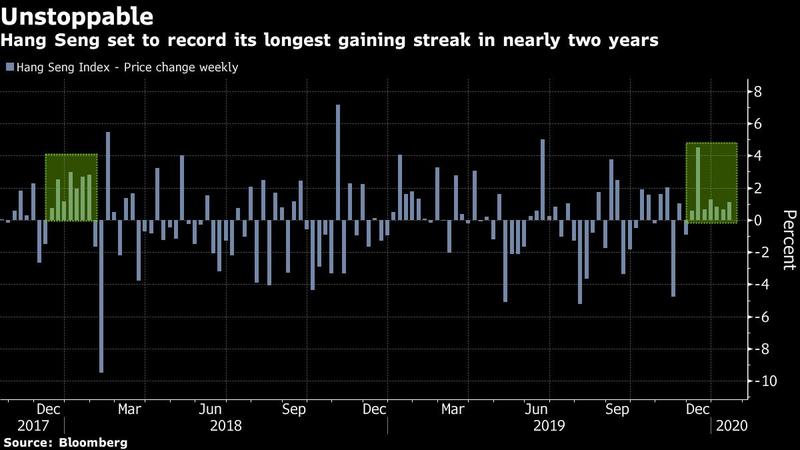 An employee counts Chinese one-hundred yuan banknotes at the Bank of China Hong Kong Ltd headquarters in Hong Kong, Nov 12, 2016. (PHOTO / VCG)
An employee counts Chinese one-hundred yuan banknotes at the Bank of China Hong Kong Ltd headquarters in Hong Kong, Nov 12, 2016. (PHOTO / VCG)
Valuations have jumped, earnings estimates are up, and forecasters are raising their targets on Hong Kong’s stock market, which has gone from pariah to darling in under half a year.
While investors around the world consider how a strengthening yuan could boost economic growth, the impact is increasingly felt in a city that is entwined with Chinese demand and global risk-on sentiment. Hong Kong shares have gained 11% since a low on Dec. 4, adding US$579 billion to market values through Monday and pushing the index back to the level it was trading at last year before social unrest escalated.
Hong Kong shares have gained 11% since a low on Dec. 4, adding US$579 billion to market values through Monday and pushing the index back to the level it was trading at last year before social unrest escalated
Before becoming one of the world’s best performers in the past six weeks, the city’s equities were among 2019’s weakest as the chaos plunged Hong Kong into a recession.
READ MORE: Lam: HK's financial setup solid despite volatilities
The Hang Seng Index slipped less that 0.1% as of 11:21 am local time following three days of gains. Buying momentum for the gauge is near the highest in two months, with a valuation close to its 10-year average.
Though there could be a near-term pause for Hong Kong equities as the initial trade deal between the US and China -- which has been boosting risk assets globally -- is due to be signed Wednesday, “we are still upbeat on stocks given the solid volumes lately and news stream,” said Linus Yip, chief strategist at First Shanghai Securities.
ALSO READ: Sale of Asia ex-Japan G3 bonds in HK sees 3-year high in 2019
The Hang Seng Index, on pace for what would be its first seven-week run of gains since January 2018, has been supported by a number of factors, including cooled local tensions and signs that China’s economy is stabilizing. Meanwhile, the Hong Kong dollar has been rallying and there’s been renewed love for former favorites like Tencent Holdings Ltd., which is at its best since mid-2018 and has made up nearly one-quarter of the Hang Seng Index’s advance since the start of December.
It’s all adding up to what Jefferies Financial Group Inc. strategists on Monday called a period of triple short-covering.

Mainland investors are behind the wave of buying, too. There’s been net purchases of Hong Kong equities via exchange links with Shanghai and Shenzhen every month since March, and flows have been strong to start 2020. Sentiment has been boosted in part by the yuan getting to its strongest level versus the US dollar since July as trade tensions have cooled.


